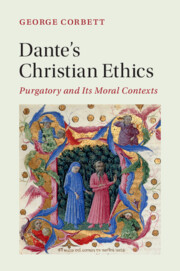Book contents
- Dante’s Christian Ethics
- Cambridge Studies in Medieval Literature
- Dante’s Christian Ethics
- Copyright page
- Contents
- Acknowledgements
- Editions Followed and Abbreviations
- Introduction
- Part I Ethical and Political Manifesto
- Part II Reframing Dante’s Christian Ethics
- Part III Penance and Dante’s Purgatory
- Chapter 5 The Terrace of Pride, and the Poet As Preacher
- Chapter 6 The Terrace of Sloth, and the Sin of Scholars
- Chapter 7 The Terrace of Avarice, and the Love of Children
- Conclusion
- Bibliography
- Index
- Cambridge Studies in Medieval Literature
Chapter 6 - The Terrace of Sloth, and the Sin of Scholars
from Part III - Penance and Dante’s Purgatory
Published online by Cambridge University Press: 28 February 2020
- Dante’s Christian Ethics
- Cambridge Studies in Medieval Literature
- Dante’s Christian Ethics
- Copyright page
- Contents
- Acknowledgements
- Editions Followed and Abbreviations
- Introduction
- Part I Ethical and Political Manifesto
- Part II Reframing Dante’s Christian Ethics
- Part III Penance and Dante’s Purgatory
- Chapter 5 The Terrace of Pride, and the Poet As Preacher
- Chapter 6 The Terrace of Sloth, and the Sin of Scholars
- Chapter 7 The Terrace of Avarice, and the Love of Children
- Conclusion
- Bibliography
- Index
- Cambridge Studies in Medieval Literature
Summary
Dante explicitly associates himself with the sin of pride (Purg. xiii, 133–38), and scholars have emphasised, in particular, the temptation to pride in the composition of the Commedia itself. By contrast, Dante makes no such explicit association between himself and the sin of sloth. Sloth might seem a strange sin to ascribe to the poet whose magnum opus, he informs us, had made him for many years lean (Par. xxv, 3).The terrace of sloth, nonetheless, is privileged by Dante: structurally, it is at the literal centre of Purgatorio and thus of the poem as a whole; narratively, it is midway (nel mezzo del cammin) both through Purgatory (the fourth of seven terraces) and through the afterlife (the fourth day on the pilgrim’s seven-day journey); thematically, it includes the discourses on ordered and disordered love as the Christian principles of moral good and evil respectively. Moreover, the very first group of souls whom Dante encounters on his journey through Hell (the ‘wretched souls’ of Inferno iii, 35) are partly characterised by sloth, as are the ‘sad souls’ (tristi) who emit the ‘accidioso fumo’ of Inferno viii. Sloth dominates the moral colour of Ante-Purgatory (Purgatorio i–viii), a region invented by Dante and occupied specifically by those who delayed, albeit in different ways, their conversions to the path of Christian holiness and penitence. Likewise, sloth is associated with the very first group of blessed souls whom Dante-character encounters in Paradise, the ‘slowest sphere’ of the Moon (Par. iii, 30). In each of the three canticles, therefore, the first group of souls is characterised – at least in part – by the vice of sloth. Moreover, after his Christian conversion, sloth was the dominant sin – we learn in Purgatory – of the poet Statius, one of the important autobiographical ‘cyphers’ for Dante in the Commedia. Most significantly, there is good reason to believe, as I shall argue, that sloth is Dante-character’s first sin in the dark wood of Inferno i, and a key to his dramatic confession to Beatrice in the Earthly Paradise.
- Type
- Chapter
- Information
- Dante's Christian EthicsPurgatory and Its Moral Contexts, pp. 133 - 165Publisher: Cambridge University PressPrint publication year: 2020



